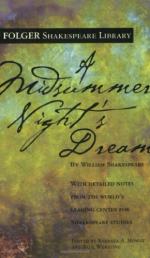|
|
A Midsummer Night's Dream Topic Tracking: Dreams/Sleeping
Act I, Scenes 1-2: "Athens, A hall in the palace of Theseus" & "A room in Quince's house in Athens"
Dreams 1: The title holds the word "dream," inferring that the play will be either a dream or will talk about dreams. The interpretation is up to the audience member or reader. However, the title foreshadows so many events that occur in the play and also subconsciously sets a mood before the first line is even uttered.
Act II, Scenes 1-2: "Night, A wood near Athens" & "Another part of the wood"
Dreams 2: As Oberon explains the nature of the magic flower juice, he mentions that it must be placed upon sleeping eyelids. Dreams come to life during sleep. So, the magic juice works in collaboration with dreams and only works when the person is asleep, perhaps dreaming or perhaps awaking to a new dream.
Dreams 3: This is the first placement of the magic juice on sleeping eyelids. Oberon uses the flower juice on Titania to play a trick on her/teach her a lesson. He whispers into her sleeping ears that when she wakes, she will fall in love with something vile. She is sleeping as he whispers so his words could be heard in a dream.
Dreams 4: Hermia and Lysander slow down so that they may sleep for the night. However, they sleep separately, cueing Puck and perhaps separating their possible dreams. Hermia sleeps far from Lysander because her chastity as a maid is important.
Dreams 5: Puck has placed the magic juice in Lysander's eyes, so when Helena spots him on the ground, she wakes him up for fear of death or injury. He is sleeping and awakens in love with Helena, entering a new dream, a new fantasy. He has transformed his feelings in his dream.
Dreams 6: Hermia awakens in the woods, alone, looking for her beloved Lysander. She has had a horrible nightmare and wants Lysander to comfort her. In her nightmare, a serpent is eating her heart and Lysander sits "smiling at his cruel prey" Act 2, Scene 2, line 150. She is frightened and alone. Her nightmare foreshadows the treatment she will soon receive from Lysander.
Act III, Scenes 1-2: "The same spot in the wood" & "Another part of the wood"
Dreams 7: Titania wakes from her slumber to see Bottom as a donkey and immediately falls in love with him. This amity is because of the magic juice placed on her during her sleep. When she awakens, like the Athenians, she is entering another dreamlike state, an altered reality transformed from her sleep.
Dreams 8: Oberon places the magic juice on the sleeping eyes of Demetrius so that he will wake and fall in love with Helena. This was the original plan confused by Puck that started the chaos in the woods.
Dreams 9: Oberon now makes sure that he uses the sleeping-dream state to right all of these wrongs. He commands Puck to fix everything. Puck tricks the two men into a slumber and places the magic juice on Lysander's eyes. The four lovers fall asleep together, in blissful harmony.
Act IV, Scenes 1-2: "The same portion of the wood" & "Athens, A room in Quince's house"
Dreams 10: Oberon plans to return the fairy world to normal, since he has already done so with the mortal world. He plans to awaken his Titania from her dreamlike trance of being in love with Bottom, the ass. He plans to have the evening remembered "as the fierce vexation of a dream" Act 4, Scene 1, lines 70-72. The king of the fairies plans to have the magic translated into dreams for those who experience it.
Dreams 11: Theseus, Hippolyta, and Egeus see the four lovers sleeping in the woods peacefully. They are shocked at the happy slumber, and the play seems to have come full circle as they wake up into their new happy world. They wake up from their magical dream in the woods to get married.
Dreams 12: Bottom returns to his players in Athens with his normal head. He is recovering from his "dream," and tells his players that he has had the most incredible dream and will write it into the play as "Bottom's Dream." Everything magical seems to be explained through dreams.
Act V: "Athens, The great hall in the palace of Theseus"
Dreams 13: Puck addresses the audience in the closing lines of the play telling them that everything they have just seen is a dream. Every vision, every touch of magic that was just enacted, he tells them, can all be explained by dreams and slumber.




